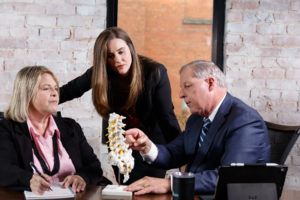Back pain is one of the most common complaints for adults worldwide.[1] In fact, almost 65 million Americans report recently experiencing back pain, and nearly 16 million report the issue as persistent or chronic. As a result, back pain is the 6th highest contributor to health costs in the United States, with both direct and indirect costs amounting to over $12 billion dollars annually.[2]

The causes for back pain can vary from a muscle or ligament strain to arthritis or osteoporosis. The severity of back pain can also vary from mild to debilitating. In 2012, one study found that low back pain accounted for 3.15% of all emergency visits in the United States.[3]
When Should I See a Doctor?
With the wide variety of causes and varying levels of severity, you may find yourself asking, “Is my back pain serious?” According to the Mayo Clinic, most symptoms associated with back pain will gradually improve within a few weeks. However, there are several red flags that should signal to you that it’s time to seek medical attention. Those red flags include:
- Back pain that persists longer than a few weeks
- Back pain that is severe and/or spreads down one or both legs, especially if the pain extends below the knee
- Back pain that causes weakness, numbness or tingling in one or both legs
- Back pain that is accompanied by unexplained weight loss, a fever, and/or bowel or bladder problems [4]
In addition to the red flags outlined above, experts agree that you should seek medical treatment if you experience back pain after a fall, blow to the back, or other traumatic injury like a car crash.
Car Crashes & Back Pain
In 2019, there were over 128,000 car crashes in the Commonwealth of Virginia alone. Out of those crashes, 65,708 resulted in injury.[5] In many cases, symptoms associated with a traumatic injury can take time to develop, which explains why individuals frequently opt out of going to a doctor directly after a car crash.
But here’s the truth: no matter how long symptoms may take to develop, traumatic back injuries from a crash can have a lasting effect on the body for years to come. The National Institute of Health reports that 62% of people who sustained whiplash injuries in a car crash experienced major residual effects for as long as 10 to 15 years after the wreck.[6] Furthermore, according to the Journal of Accident Analysis and Prevention, 63% of ongoing low back pain can be attributed to a prior injury in a car crash.[7] These statistics make it clear that back and/or neck injuries need to be taken seriously as soon as possible.
“Minor” Car Crashes
One of the most common arguments I hear from insurance companies is that “minor,” or “little-to-no damage” car crashes don’t cause serious injuries. This is simply not true. During a car crash, your body is exposed to a variety of forces such as acceleration and deceleration. These forces can cause serious injuries, especially to particularly vulnerable parts of your body, like your neck and spine. During impact, the soft tissues surrounding the spine can strain, causing neck, back and shoulder pain, as well as headaches and other symptoms.
When to Talk to a Personal Injury Attorney
Unfortunately, insurance companies are in the business of making money, not advocating for you. For that simple reason, if you are injured in a car crash, you should talk to an experienced attorney right away. Unlike insurance companies, the number one goal of any good personal injury attorney is to protect your interests. Don’t let money-hungry insurance companies decide the value of your case. Leave that to the experienced professionals here at Allen and Allen. Call 866-671-4306 today for your free consultation and let me advocate for you and what you deserve.
[1] “Back Pain.” Mayo Clinic, Mayo Foundation for Medical Education and Research, 21 Aug. 2020, www.mayoclinic.org/diseases-conditions/back-pain/symptoms-causes/syc-20369906.
[2] “Chronic Back Pain.” Health Policy Institute, 13 Feb. 2019, hpi.georgetown.edu/backpain/.
[3] Written by Shelby Deering; Reviewed by Santhosh A. Thomas, DO. “How Do You Know When Back Pain Is Serious?” SpineUniverse, www.spineuniverse.com/conditions/back-pain/how-do-you-know-when-back-pain-serious.
[4] “Back Pain.” Mayo Clinic, Mayo Foundation for Medical Education and Research, 21 Aug. 2020, www.mayoclinic.org/diseases-conditions/back-pain/symptoms-causes/syc-20369906.
[5] 2019 Virginia Traffic Crash Facts, Department of Motor Vehicles, Virginia Highway Safety Office
[6] Freeman, M D et al. “Chronic neck pain and whiplash: a case-control study of the relationship between acute whiplash injuries and chronic neck pain.” Pain research & management vol. 11,2 (2006): 79-83. doi:10.1155/2006/304673
[7] Nolet, Paul S., et al. “Exposure to a Motor Vehicle Collision and the Risk of Future Back Pain: A Systematic Review and Meta-Analysis.” Accident Analysis & Prevention, Pergamon, 18 May 2020, www.sciencedirect.com/science/article/pii/S0001457519316884.


